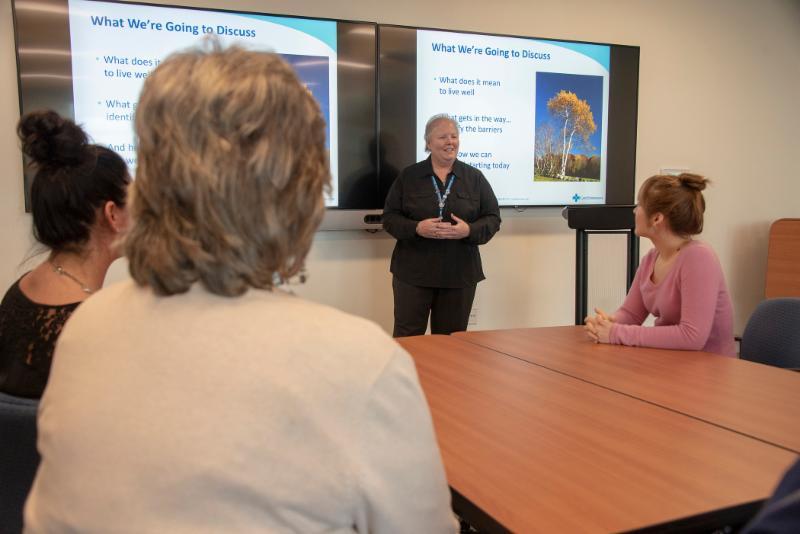July 2019 Newsletter

Publication Date: July 31, 2019
Share your Personal Serious Illness Care Stories

The Boston Globe is looking for people in Massachusetts to share their personal experiences with serious illness care for an upcoming story. If you or anyone affiliated with your organization is willing to share a story with the media, please visit this website to fill out a short survey. It includes questions about advance care planning, communications with clinicians and among family members, and care received at the end of life.
Making community outreach a priority helps Care Dimensions promote advance care planning

Engaging hospice care for at least a month can profoundly improve the experience of care near the end of life. While trends are improving, far too often patients are not enrolled in hospice or are enrolled for just short times. In 2015, about half of Medicare beneficiaries used hospice in their last months of life, but the median stay was just over three weeks. And still, about 8 percent were only in hospice for three days or less.
Coalition member Care Dimensions, the largest hospice provider in the state, has been working to change those numbers for the past 40 years, with an emphasis on education and community outreach. “We are an organization that is committed to creating the best outcomes possible for people who are dealing with serious advancing illness,” says Care Dimension President and Chief Executive Officer Pat Ahern. “We don’t believe people should wait to get the very best care.”
Mary Crowe, Director of Professional and Community Education, spends a lot of time on the road. She presides over some 500 events at different locations per year divided between professionals and consumers. “Better understanding of end-of-life care improves the quality of care that is provided, which in turn improves the quality of life for those we care about,” she says.
The Care Dimensions outreach programs aimed at patients and families are held in a variety of locations from health facilities to churches. “We want to give them a level of empowerment, so they can take charge of their health care,” Crowe explained. “Many people have the misconception that hospice is about dying, when it should be focused on living well with the time they have left.”
Ahern believes another misconception some people have is that talking about serious illness and death will make it happen. However, in her experience as nurse in a trauma center Ahern saw the consequences when families didn’t make their preferences known and select a health care proxy. “We have to give our families permission to represent us,” she says. “We encourage people to have discussions about who they want to be their voice when the time comes.” Crowe’s training sessions are designed to make sure patients understand the importance of having the proper documents in place and to allay their fears that writing down their wishes will lead to a loss of control of their care.
Care Dimensions programming for professionals is modified depending on the participants, whether they are doctors, nurses, nursing assistants, therapists, activity directors or case managers. Her presentations are designed to fill what is often a gap in their education about how to have advance care planning conversations with their patients. “Many providers have a hard time approaching it because they worry it will be perceived as giving up,” Crowe explained. “Our programs give them the skill set to have these conversations.”
Crowe covers a variety of topics in her seminars including the best ways to care for people with advanced illness, what living well is, and strategies for engaging people in conversations. Depending on the audience, Crowe uses many techniques including role play and showing relevant movies, such as Tuesdays with Morrie, to facilitate conversation.
Ahern believes all professionals need to be comfortable with advance care planning conversations, no matter what role they serve in the process. “It is the dream of my lifetime that there will no longer be doctors who say there is nothing more I can do,” she says. “We are trying to help these professionals do everything they can to support their patients including palliative care and hospice.” Plans for the future include aligning all their education programs under the name “Care Dimensions Learning Institute” in late 2019.

Another priority for Care Dimensions is to be involved in the formation of professional nurses for the future - particularly in this time of nursing shortages. Care Dimensions Director of Research Susan Lysaght Hurley is working with Anne-Marie Barron, Associate Dean of the Simmons College School of Nursing to co-lead the Coalition’s effort to create a curriculum for Massachusetts nursing students about serious illness care and advance care conversations. “I often wonder when we will commit to having every nursing student care for a dying patient with the same fervor we have that every nursing student observe a baby being born,” Hurley said in her speech about the project at the Coalition’s May Summit. “So few of us go to work in labor and delivery and nearly all of us encounter dying patients whether inpatient or in the community.” Next year the group hopes to release the findings from a survey designed for schools of nursing to determine current practices for teaching serious illness care to the Massachusetts Association of Colleges and Nursing Deans and Coalition members.
To find out more information about Care Dimensions, visit their website.

